| |
Reflections on Holy Week, 2012
by Beth Adams
Saturday, March 31
Clarity and Chaos
Tomorrow, it begins: semaine sainte, Holy Week. It's always a complex time for me as a choir singer, with the time-commitment of rehearsals and daily services to juggle along with normal life; larger-than-usual congregations; physical fatigue; and the emotional toll of that much repetition of suffering and horrible death, along with my own doubts and questions, fears, desires, memories...
My music folder is bulging with a huge amount of repertoire; we're always somewhat under-rehearsed for this period, so I already expect to have to concentrate hard. This year we've only got six sopranos in a choir of more than thirty voices, and a lot of music divided between two soprano parts, so that ratchets up the responsibility, plus, midweek, J. and I will be returning to a chaotic home with one functioning bathroom, sheetrock dust everywhere, and our bed piled with boxes and covered with plastic, but the renovations are unlikely to finish before Easter. Wish me luck!
On the other hand, the annual Lenten retreat two weekends ago clarified some things, and I'm continuing to think about it. It was the first time I've been asked to teach meditation in a Christian context, and I led three introductory hour-long sessions, and one that went into somewhat greater depth and detail.
I had worked hard to prepare, re-reading some texts that had been helpful to me, thinking about how to talk about what meditation and contemplation are, their history within the Christian church, our debt to the East (both Eastern Orthodoxy and the Eastern religions), what meditation is not, and why it's worth doing. All that had to be simply introduced in thirty minutes or so. And then the practice itself needed to be explained, demonstrated, and tried for about fifteen minutes, with a brief discussion of distractions and how to deal with them – followed by time for questions. Of course the first session was the hardest, since there was no way to be sure about the timing, but it got easier after that.
Other people -- including the Dean, a soon-to-be-ordained seminarian, a licensed spiritual director, and a professed Anglican nun -- led other workshops on different types of prayer during the same retreat, which took place over a Friday evening and all day Saturday. With a friend's help, I set up a space for my own sessions using a beautiful rug she lent me, a wooden bench that held candles, a small spray of white freesias, and a little porcelain bowl filled with rice from my own meditation space at home: I use it to hold incense, but it's also symbolic to me of the rest of the world's people. We used some of the kneelers shown in the photo above as makeshift meditation cushions; the less flexible participants were welcome to use chairs. We were in a conference room, but when the lights were dimmed and the candles burning, the space became inviting; by the end of the retreat it felt holy.
The Dean has recently introduced several periods of silence into our services, and a number of people told me that, before these sessions, they had no idea what to do during that time, no idea what wordless prayer or meditation might feel like or how to do it. Several people said they had tried to meditate before but had been discouraged and overcome by their mental activity; one said he thought he was the only one whose mind was so noisy and busy, and felt very reassured to learn that was normal. Others had had trouble staying awake, or had never tried some of the techniques I suggested for bringing the mind back to a centered, quiet place. But most of the people were totally new to it: new, and curious to try. I was honest about my own background – my teacher was a Tibetan Buddhist and I learned through that tradition and Zen, gradually finding my way back to Christianity through Thomas Merton, and the advice of many Eastern teachers to find the parallel teachings in one's own cultural tradition. No one seemed to object!
I stressed the importance of humility on any spiritual path, and mentioned the paradox I've learned through this thirty-year wrestling match with my own ego: that not one of us is any more special than any other, and yet each of us is unique, loved, and completely special -- and that we are all connected. Meditation has shown me how desperately the ego tries to hold on, and it's taught me what happens when we are able to let go. It's not a path for the faint of heart, nor one that ever ends. Any honest introduction to meditation needs to say that.
I've always been clear with myself that I wouldn't do this sort of teaching until, or unless, I was asked. Now I'm not sure where it will lead, but in conjunction with my friend I'll be offering two additional sessions at the cathedral on Wednesday, leading up to the most contemplative and serious days of the liturgical year. Through all of this I'm listening to the process, watching the faces as I speak, and thinking hard about the questions that are asked. I know, for sure, that sitting with these participants for many hours gave me a degree of calm I haven't felt in a long time, and it's lasted; I'm grateful to have that, on the eve of this Holy Week.
*
Sunday, April 1
Palms
In a church bedecked with extraordinary sculptural arrangements of palms (a devotional Quebec tradition) we sang, lamented, and participated in a modern-day passion play: a re-enactment of the last hours of Jesus' life. Because I was singing in the baptistry, one of the two spaces on either side of the main chancel of the church, I couldn't see the litugical dancers or the action of the play. But as Jesus was symbolically crucified, I helped make eerie music, rubbing a wet finger around the rim of one of ten water glasses; this was folowed by "thunder" from the organ and a piano being played inside, on the strings, as darkness came over the land, and the "curtain of the temple was rent asunder."
Liturgy, drama, music, art: the sermon quoted Pablo Picasso: “Art is a lie that makes us realize truth.” What is the truth of Holy Week, of this two-millenium-old story? Maybe nothing, for a great mjority of people today. But I'm fortunate to belong to a denomination that doesn't focus on literal "truth" but instead encourages each person to think, to grow, to use this time for reflection on death, on suffering, on doubt, on fear, on power and politics, on the role of hate and love in each of our lives, on our avoidance of truth and the deals we make.
Before the morning service the whole congregation processed outside, in the cold, around the cathedral, carrying our palms, singing hymns accompanied by a brass choir. Tourists gawked and took pictures of us; from the department shop windows, photographs of impossibly gorgeous models for perfume, men's underwear, and make-up watched too.
In-between the services I walked out of the choir room, in the cathedral's undercroft, into the underground city. I had put my palm fronds into my backpack, and they waved behind my head, the strappy green leaves slapping against each other in time with my footsteps. In the mall, life went on as usual. People were buying, eating, being tempted by advertisements and shop windows, strutting their new spring fashions - short skirts, lace tights, platform shoes. I ate some lunch, checked my email on my phone, looked at pretty bras and linen jackets. And that was just as it is, and has always been: the world is the world, and human beings are human beings. Me too. I saw nary another palm frond, but where I once would have been embarrassed, I rather liked having them with me.
All this will pass away one day, just as the palms will be burnt and become ashes to be placed on our foreheads, on my forehead, which will one day be lifeless too, before being burnt or buried. That doesn't bother me, today; what concerns me is being here, really here, in this particular moment, with the noise and bustle of the mall, the smells of hamburgers and frites , the colors of bright jeans and arrays of eyeshadow, and the passage of all this beautiful, broken humanity of which I am one intrinsic part.
*
Monday, April 2
Contrasts
It was easier to avoid the secular world when I lived in the country. All I had to do was go out into my backyard garden, sit at the piano for a few hours, spend an afternoon in my studio...my husband always heard the lawn mowers and leaf-blowers, but I guess I tended -- or pre-tended -- to hear the birds.
The city doesn't allow that. Step out the door, and it opens its maw. The sound of traffic is ever-present, even indoors, as are voices speaking many languages; airplanes and helicopters overhead, police sirens, ambulances and fire trucks; even the birds seem aggressive, competitive, clamouring for their share. Someone is always selling, someone's buying; someone is begging, someone else is showing off.
The city is much more real, much more a reflection of our world, in a human sense, or so it seems to me. The countryside, so much a part of my own identity, has come to rest in some internal space. I visit it in dreams, in memories...but my daily reality has changed. During these weeks of living downtown, on the twentieth floors of hotels, I've been able to watch the city move, watch it wake up, go through its day, go to sleep. Pigeons flutter onto fire escapes; gulls wheel on thermals between the skyscrapers. The trains come and go from Gare Centrale; the taxis swim up Boulevard Rene-Levesque, the hockey fans come to games at Le Centre Bell and stream out far below my eyes. Customers enter Chez Paree and Club LaBoom, which advertise danse contact ; next door, Muslims go upstairs to their mosque. Motionless, I stand at the window and look out down, look out - toward the city stretching in all directions, toward the shiny pale blue ribbon of the great river, toward the mountains of Vermont.
This is a new stillness, not requiring silence. An urban stillness I'm learning in the midst of constant motion, crowdedness, squalor and clutter, beauty and glitter; amid things I don't understand and things I understand too well; a stillness in spite of the fact that I myself am moving, changing; a growing solitude that is, paradoxically, full.
*
Tuesday, April 3
What Lasts?
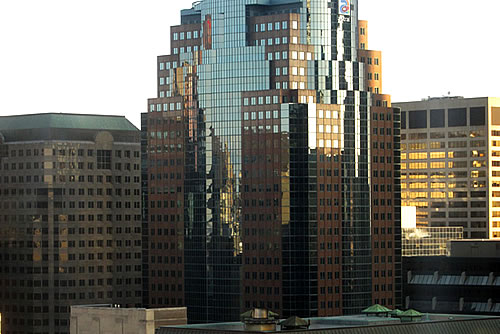
The city changes hourly. The sun rises and moves across steel, glass, and stone, catching one edge of a building and then another, setting reflections shimmering on their mirrored faces. Movement begins, sunrise ends; the day settles upon the city, the reflections shift, colors and corners glow and recede into shadow. Eventually lights flicker on, the sky reddens, a planet or a moon appear, a searchlight beacon traces paths through the fog, and windows and floors go dark for another night. In the morning, it begins again, but perhaps the light is soft today, the sky overcast, the sub obscured; or perhaps it's raining and the streets, dark and polished like mirrors, trace a pattern through the city unseen on sunny days. All these structures, drawn up from the earth, from rock that's passed through fire, convince us daily of their permanence, solid and immutable except for the light arcing across their surfaces, the water cascading down the glass onto the streets and running back into the earth.
We're not like that, we living things. Our period is not a day; our countenance doesn't change with the weather or the seasons. In this landscape we've created, we're born, grow, age, and die, and others come to take our places, streaming out of the commuter trains, up from the underground, arrriving on boats and planes. From my perch, high above the city, I see.
*
Embedded within the present moment are the structures of long ago: verdegris steeples, hidden among office buildings; the brick stores and apartments, the ornate stores and hotels of past centuries dwarfed by modern, sleek towers. In that middle level, I follow black iron fire-escapes zigzagging down old brick and stone, hung with a bits of laundry that wave across the centuries. On the side of the mountain, the former heights: old mansions of merchants, railroad barons, shipping magnates; the hospital named for Victoria; the cross that once presided over a devout city where Catholicism reigned, and now shares the highest real estate with media antennas sending a quite different message down to the people below. In the distance, a city of cranes are building a new super-hospital; nearby, others lift steel girders to the tops of new office towers.
We build our edifices, and then we disappear. Is it sad? I don't think so. In the trains and on the downtown streets, I've watched the people: their incredible diversity and their astonishing beauty, of which most seem quite unconscious. Babies blinking at their very first spring. Boys and girls playing at being adult. Busy commuters hurrying to work or hurrying home. The old man on the corner of St. Catherine and Stanley, singing show tunes at the top of his lungs. Nothing we create or build could ever rival these fleeting watery creatures, their fragility, their strength, their mysterious origins and departures.
* Thursday, April 5
Cup
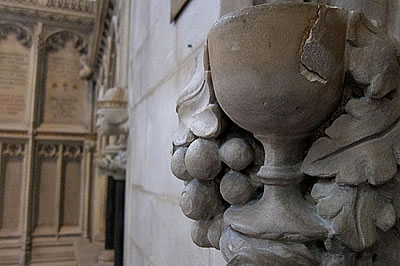
You must be willing to drink this cup, we're told, more than once during this week of lamentation; we'll also hear the condemned man cry "Take this cup from me!" But what is my cup? What is the draught I'm asked to drink? Is it new wine, or bitter herbs?
Yesterday, my husband and I made a trip to a marble and stone seller in the northern part of the city to pick out two small pieces for our renovated bathrooms. When we stepped into the showroom, we nearly fell over. Polished rectangles of stone, from all over the world, hung on the walls and on two wall-to-ceiling panels, each piece more beautiful than the next. The colors ranged from white to green to rosy pink to black, with a dazzling array of patterns. We worried that we wouldn't be able to afford any of them, even the small pieces we needed, but saw two we completely loved. The Italian saleswoman introduced us to a man she said would help us. Go with him into the back room, she said, and he'll show you what's available.
We stepped through a door, out of the shiny showroom, and into a huge dusty warehouse filled with slabs of marble and stone in wooden racks. Step very carefully here, he cautioned, as we skirted a piece of bright yellow equipment. And here, watch your step, it's wet...the floor was slimy with stone dust and water. Still, we moved through the warehouse far more quickly than we wanted -- neither of us had ever seen anything like it -- and into a second huge room, this time a work bay with saws and other types of heavy equipment. Small slabs of stone were stacked against the back wall. Here, let's see if we have something that will suit you, he said.
We quickly found a piece of grey-veined carrera that was perfect for the shower sill, and he wrote our name on it with a grease pencil. The other we were looking for was red, we told him, and his face clouded. I don't think I have any small pieces of red marble, he said, leading us over to a very large one, big as a dining room table. We only needed a piece 3 inches by 66, we said, hopefully. How about another stone, he suggested. Granite? Please show us, we asked. He led us again to the back wall, and ran his finger across the first of two tall narrow pieces; his swipe revealed a deep red. We looked at each other. That would be perfect we said. It looked exactly like the sample we had loved in the showroom, which had apparently been granite, not marble. He measured the first: 64 inches, and shook his head. Maybe the one in the back, he said; it was taller, but had a notch at the top so that it was quite narrow. Let's see. He took out his tape again and stretched it; 68 inches. And you needed 3 inches across? Yes...he measured the top. 3 1/2 inches. He smiled and looked at me: perfect! he said. Meant to be! I answered. Yes, meant to be! It's yours. He wrote our name again, and we went out to find out the price from the saleswoman. She calculated, subtracted the contractor's discount: it was a very reasonable figure, and we nodded, that was fine.
From there, my husband dropped me at a metro station; I had one hour before I needed to be at the cathedral to teach two meditation sessions in the afternoon. When I arrived at the McGill station, downtown, I stepped out of the train and started up the steps. Over on the other side of the same stairs, where people were descending, sat a man on the very bottom step. He was slumped to one side, his long white hair unkempt, and in one hand he held a white baseball hat. As I hurried up the stairs I noticed, even at a distance, that something seemed wrong with his eyes. I climbed to the top, and then stopped, turned around, and watched. The commuters streamed by him, not noticing, or perhaps refusing to notice. Then someone stopped and seemed to bend down; no, he was just getting a better grip on the bicycle he was carrying up from the train. The man slumped further against the wall; there was a puddle near his feet that was probably urine. That was the point of decision; I turned around and headed back down the stairs, feeling in my backpack for my purse and in my pockets for any loose change.
The trains had gone; no one else was on the stairs. The man's head was bowed and he didn't look up even when I approached and stood near him. I bent down, and put all my change into the baseball hat which tipped to one side: open, expectant, empty. Bonjour, Monsieur, I said, willing him to look up. Slowly, very slowly, he raised his head, first looking in the cap to see what had changed its weight, and then lifting his eyes toward this stranger who addressed him as "Monsieur." His left eye was completely gone. The skin around his right eye hung in deep folds beneath it, the lower eyelid stretched and turned outward, weeping, a dark red color-- the same deep red as the stone we had just bought. Out of that horrible socket, though, his eye slowly focused on my face as I held onto it with my own gaze. Bonjour, Monsieur, comment ça va, I said softly, and watched the light in his eye brighten ever so slightly. It was as if he -- the man inside this ravaged body -- were swimming up from a great depth, having almost forgotten how. We looked at each other, and something like a smile formed on his face. Merci, he said. Merci. I touched his shoulder, and then I climbed up the stairs, went through the turnstile, walked into the underground mall, went down the escalator and through the foodcourt, weaving diagonally through the maze of tables and chairs, entered the bathroom, went into a stall, and sat down and burst into tears.
Then, after a little while, I left the stall and washed and dried my face, ate a bowl of lentil soup, and went to the cathedral.
* Friday, April 06
Feet
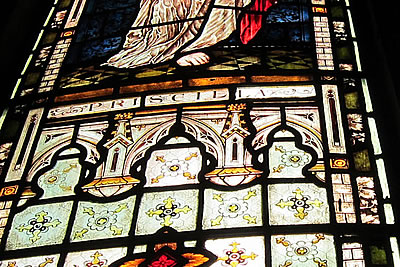
Last night, Maundy Thursday, we celebrated the institution of the Eucharist, or Communion, by Jesus at the "Last Supper:" his Passover meal with the disciples. The Gospel of John, unlike the other accounts of that night, tell us that Jesus, knowing he was about to die and wanting to make symbolic, even startling gestures that the disciples would remember, took off his outer garment, wrapped a towel around himself, filled a basin with water, and began washing the disciples' feet. During the Maundy Thursday liturgy, the priests do this same thing: they remove their elaborate outer robes, and taking towels and basins of water, wash the feet of the parishioners who come forward. Fr. Richard Rohr explains the symbolism this way:
Perhaps John realized that after seventy years, the other Gospels had been read. He wanted to give a theology of the Eucharist that revealed the meaning behind the breaking of the bread. He made it into an active ritual of servanthood and solidarity, instead of the priestly cult that it has largely become.
After the service, some of the bread and wine is reserved for communion today, Good Friday, which sets it apart from every other day of the year. And then the lights are dimmed and the altar stripped. In our church, a small side chapel has been made into a "garden", to remind us of Gethsemanii, where Jesus prayed all night that he might be spared, knowing he would be betrayed by one of his followers. There are green plants, and many candles, and people keep a vigil all night long. Every time Jesus returned to his disciples, during that long night, he found them asleep and he sadly rebukedthem, saying, "Could you not stay awake with me one hour?" Later, when he had been arrested and taken away, they all deserted him and fled.
I always leave Maundy Thursday feeling disturbed, sorry, and wondering about our shared human weaknesses, and my own. What are the times in my life when I've deserted the people I love most? How have I betrayed my friends, my beliefs, my better self? How am I still doing that?
Good Friday, today, is somehow easier for me to take, easier to understand, even with its focus on grief and suffering, which remind us of our wn griefs. It recounts the trial, public execution, and death of an innocent person, something we have seen again and again in our world. Someone else did that, I can tell myself, as I always do when I read the papers or see the latest atrocity. I'm not directly responsible. It seems like I can always convince myself that there is a "they" who is more guilty than I am.
The Maundy Thursday questions, for me, are much harder; I cannot wriggle free.
* Friday, April 06
Three Days 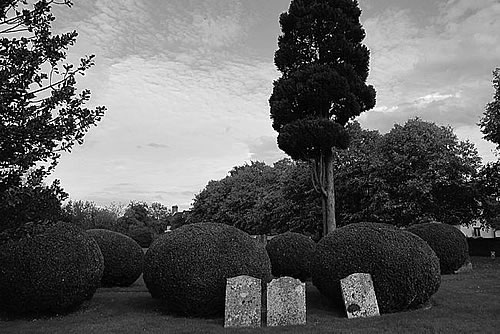
Churchyard, Lavenham, England, October 2011
Triduum: The Three Days: an explanation at the Wikipedia
Solus ad victimam, by Kenneth Leighton , sung by the Salisbury Cathedral Choir. We performed this piece at Evensong last week, on Palm Sunday.
*
Saturday, April 07
Into the Darkness
We're up early, because we're moving home today. It's been a fascinating month, much of it lived high above the city, but I am so happy to be going home.
Today is a quiet day. I'm cleaning, doing laundry, making a big dish of scalloped potatoes for tomorrow evening's choir potluck, after we're all done, and catching up on a bit of blog reading and writing.
So here is some music (these are both pieces that we sang yesterday):
Gesualdo, "O vos omnes "
Jacob Handl, "Ecce, quomodo moritur iustus"
At Evensong tomorrow, my own choir will be performing Ralph Vaughn Williams' "Five Mystical Songs" and a number of other works. I'm looking forward to that.
I haven't been alone. There's been visual companionship: a wonderful series of photographs inspired by a comment I made to my friend, the British photographer RR, on her Stations of the cross London rail journey : “Why not do a whole set of contemporary London “stations of the cross” during Holy Week?” Which she has, dealing them out in pairs over the week:
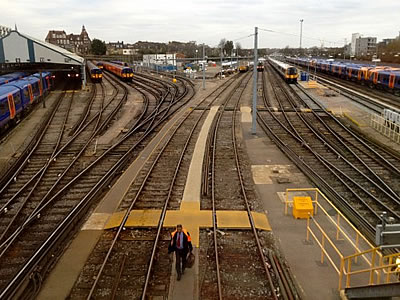
Station 12, by RR
And there's been reading, especially a wonderful post, with very moving photographs, about the ordination of a Buddhist nun in Korea two days ago; she is an American woman who I met online seven years ago. As I wrote to her just now, to me the message of both our paths seems the same: May we love one another, may our hearts be as one, may we all cease wrong-doing, may all beings one day be free.
* Sunday, April 08
New
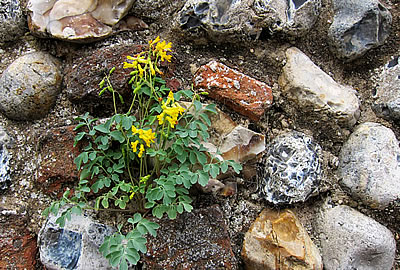
Flowers in a flint wall, Lavenham, England Happy Easter, Happy spring! *
Thursday, April 12
Home is Where You Are
We slept in our own bed last night, for the first time in a month. The house still feels like chaos, but it's a more orderly chaos than yesterday, and it's much cleaner after the work of a team sent by the insurance company. Today I got up at the normal time, dressed, and rode my bike, for the first timethis year, to the studio. Normalcy returns, whatever that is; I think the cat has her own definition and would be pleased if we'd stick to it!
While our locational perigrenations over this past month may be understandable, I'm not so sure about the internal ones. I know that it's difficult for many people to understand why someone they see as fairly intelligent and rational would spend time, year after year, in self-examination during the apparent gloom of Lent and Holy Week. I know that. And all I can tell you is that for me, as for observant Muslims during Ramadan, these periods set apart from "ordinary time" are not gloomy at all, but fruitful, and that I actually look forward to them, the way one anticipates travel. Because travel is what they are. There is the you at the point of departure, there is a journey -- with all the expected and unanticipated aspects that make travel what it is -- and there is a different you who arrives, back at a home that is no longer quite the same home it was when you left, because you are seeing it with new eyes and a changed heart. If we don't ever travel, physically or psychologically, I'm not sure we can ever really see where we are. And, I suppose, I've always believed that the examined life really is the only one worth living. A large part of my attraction to the core religious teachings -- not the church itself, mind you, but the teachings and practice -- is that they encourage that sort of examination and movement throughout life. This year, it was a double journey, because I was also experiencing my physical home - this city - from entirely new places. Living in the downtown core was very different from living in the Plateau, the neighborhood I normally inhabit. The photographs and posts here told some of that story but not all, because I haven't had time to digest it fully, or to compare the last month with what it feels like to be back home. I know that my view of the city is changed, enlarged, and more appreciative, but that I'm still glad we made our home where it is. The road from Ash Wednesday to Easter was more subtle: it certainly can't be shown in pictures. It will take more time to think and speak about. The major thing that happened is that the questions I have had, about discerning new directions in my life and work, have begun to be answered. But these are questions I asked an entire year ago, last Lent! I find that completely amusing. I'm glad for the emerging clarity, and glad that I've become patient enough, and aware enough of how it works, to wait a long time -- open, but not pushing. In one of my meditation classes, a young woman asked, "But how do I get God to talk to me? How do you get to the point of having a conversation?" Her frustration and impatience were so apparent, and she reminded me of myself many years ago. I smiled and said, as gently as I could, "All I can say is that it's more a matter of getting out of the way, of surrender rather than making demands." I saw, in her puzzlement, that she didn't like or quite get that answer, but someday, I hope, she will. I remembered all too well a teacher saying, to my own tears and frustration, "I wish I could give you the key! But I can only show you a door; you have to find the key for yourself." Still, it's happened over and over in my life, this process of examining, looking into what seems like an impenetrable forest, waiting, and waiting, and then gradually, -- or sometimes, suddenly -- seeing a path opening up. A path, a door, a hidden key with our name on it... Having the courage to take the path, open the door, try the key, is, of course, is another thing, but that's why Lent gives way to Easter.
~
words + image: Beth Adams, Canada (Cassandra Pages)
this reflection was first published directly in Beth Adam's blog
as a series of blog posts with several images on each page.
Beth consolidated all the posts into a single page:
Reflections on Holy Week, 2012
|
|